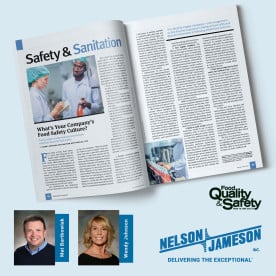Monthly Archives: February 2020
- February 26, 2020
Understanding the diverse landscape of stainless steel grades is imperative, especially when catering to the specific requirements of food-related industries. With approximately 150 stainless steel grades available today, only a select few meet the rigorous standards for food-grade applications. The 300 and 400 series steel dominate the food-grade stainless steel landscape. The 300-series, distinguished by the presence of chromium and nickel, includes notable variations like 304, widely employed in dairy, beer, and food processing due to its exceptional corrosion resistance. The 400-series, characterized by chromium dominance, encompasses varieties such as 430, notable for its susceptibility to corrosion in challenging environments. To qualify as food-grade stainless steel, the material must withstand acids, alkalis, and chlorides, ensuring resistance to caustic substances that could contribute to premature corrosion. Explore the intrinsic properties, types, and applications of food-grade
- February 18, 2020
The flu season is upon us. Illness in the workplace can cause major problems—missed deadlines, lost productivity, and therefore lost profit. When at work, we are in close proximity with our co-workers which encourages the spread of germs. Employers play an important role in preventing the spread of illness and ensuring employees stay healthy and productive. Here are a few tips to avoid an illness epidemic at your workplace:
- Handwashing. It seems elementary, but proper handwashing is the easiest way to prevent the spread of germs. The best practice is to scrub hands under water for 20 seconds. Post signage and reminders for employees to regularly wash their hands.
- Sanitizing. Hand sanitizer is a great alternative when hand washing isn't available. Encourage employees to regularly utilize hand sanitizer, especially when leaving a work space. Provide sanitizers all throughout the workplace for easy accessibility and usage.
- February 12, 2020
Cleaning and sanitizing, though often used interchangeably, play distinct and crucial roles in ensuring the safe production of high-quality dairy products, food, and beverages. Cleaning involves physically removing visible dirt, grease, and particles from surfaces, making them shiny and spotless. However, it doesn't eliminate illness-causing pathogens. On the other hand, sanitizing, which follows cleaning, reduces harmful microorganisms to safe levels. Skipping the cleaning step renders sanitizing ineffective. The process includes wetting, scrubbing, rinsing, applying sanitizer, and allowing the surface to air dry. Both actions are vital to prevent pest infestations, comply with food safety laws, protect against foodborne illnesses, and minimize waste. Training is crucial, ensuring employees understand the proper use of chemicals, concentration, mixing procedures, storage, and the importance of personal protective equipment. Color-coding tools helps prevent cross-contamination, emphasizing
- February 04, 2020
“Clean” is seemingly a self-apparent word. We know it when we “see” it, right? Perhaps we can “feel” it after we finish the process of cleaning (ooh, it can be a verb too!)? This isn’t meant to get too metaphysical or anything, but if we take a second and really consider the meaning of the term, it can get problematic quickly.
Outwardly clean-looking surfaces can easily harbor microscopic maleficence. For instance, what would happen if a food-contact surface that otherwise looked pristine had a contaminated surface as big as the head of a pin. How bad could it be? In the case of norovirus, the amount of viral particles that can fit in that tiny space “would be enough to infect more than 1,000 people”.
The
- February 03, 2020
Choosing the correct safety knife is a crucial decision that hinges on understanding the distinctions between retractable, fixed-blade, and breakaway knives. Each type serves specific purposes, and this comprehensive guide delves into the unique features and advantages of each. Retractable knives prove to be versatile choices for general or everyday use, allowing quick adjustments in sharpness and cutting depth. Fixed-blade knives, on the other hand, excel in heavy-duty cutting jobs with securely locked blades offering stability and versatility. Breakaway-blade knives, housed in brightly colored casings, feature segmented blades ideal for tasks constantly dulling blades. Explore additional specialized blades tailored for specific tasks, such as carpet cutting or crafting, and personalize your utility knife further with features like self-retraction, folding fixed-blades, efficient blade changes, hang holes, and string-cutting capabilities. This guide empowers you to make an informed decision,





